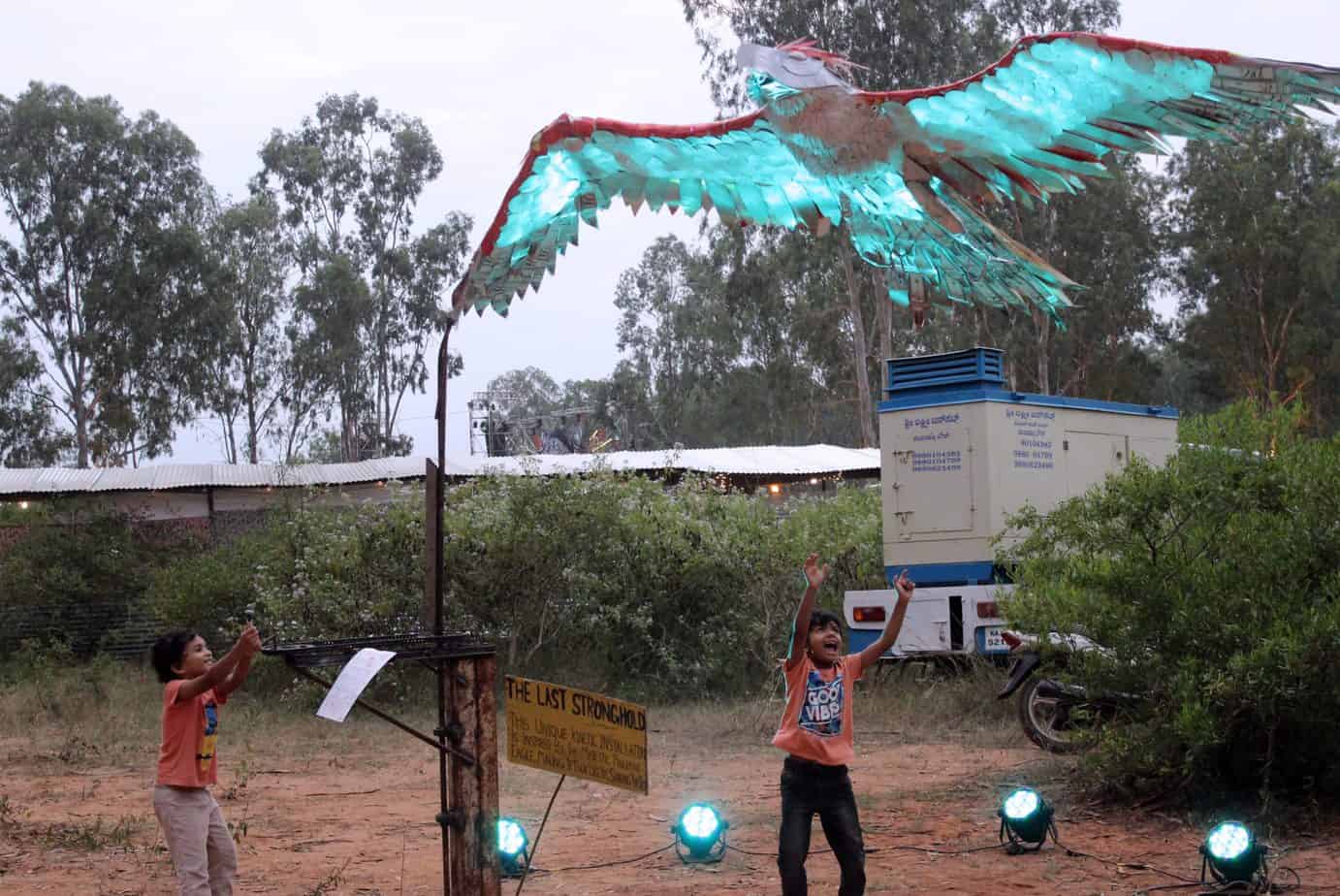What is the environmental cost of a big music event? Can art afford to be for its own sake and not think about all the plastic bottles and banners left behind without being recycled? What about the emissions from generators or the decibel levels?
These questions led Roshan Netalkar to come up with Echoes of the Earth (EOE), an annual music festival, three years ago. Held on the outskirts of Bengaluru on a sprawling 150-acre property, it was aimed at marrying music and art with the theme of sustainability. Netalkar hoped to prove that music festivals of such scale could be eco-friendly and also successful.
This year’s event on December 7 and 8 was attended by an estimated 16,000 people from Bengaluru and beyond, and was a confluence of music, art installations and a spread of food and beverages, largely centred on the theme of sustainability. The effort of the festival in every detail – from the music to the way the event is conducted – is to be all green.

Children seen playing with an installation. This year’s festival theme was ‘Sanctuary’. Pic: Srijan Sen
For starters, a good number of performers who took part tried to weave the message into their music. The Soul, a blues rock band from Sri Lanka, performed songs that speak of the rainforests. June Marieezy, also known by her stage name (((o))), is an American-born Filipina musician who practices what she preaches. Marieezy moved from the US and now operates out of a solar-powered tree house in Manila.
The essence of the festival was perhaps best captured by EOE staple Montry Manuel aka Thaalavattam. The former Swarathma member produces music using junk that varies from paint cans, PVC pipes and PET bottles to motorcycle suspension springs.
The artistes weren’t only echoing messages in support of nature. Sarathy Korwar, a British-Indian jazz percussionist, brought a message of unity that speaks more of the socio-cultural environment. Performing several songs from their new album ‘More Arriving’, the bandmates were dressed in identical t-shirts that said ‘Fly Immigrants’ – a parody of AC Milan’s jersey.
Each year the festival has a theme, and this year’s was ‘Sanctuary’ – a tribute to all endangered animals. The centrepiece of the festival — a 25-foot-tall kinetic silverback gorilla, a peacock tarantula, a Philippine eagle, a lion-tailed macaque, the pied hornbill, the Indian elephant, a Tokay gecko, a gharial, the one-horned rhino, the dugong, and a warrior walrus – was in keeping with this theme. Designer Bheemaiah K K, who set up the piece he calls ‘King Kong’, says, “The gorilla was made with recycled metal armature, gunny bags, and coir.”

Gorilla made with recycled metal armature, gunny bags, and coir by designer Bheemaiah K.K. Pic: Srijan Sen
EOE organisers, of course, follow a zero-waste policy, which means everything is recycled. All art installations were made in-house by 100 different artists working on-site with 80 percent recycled materials. According to Netalkar, it took nearly three months of work to set up the venue. Designers from the Srishti Institute of Art, Design and Technology also contributed to the installations.
Plastic bottles were not allowed on festival grounds as attendees were encouraged to bring their own water bottles or purchase one from the merchandise store. Solar power partly supplied electricity. The four stages, named after endangered species, were decorated with large installations made from recycled material.
A large part of the credit for keeping the area tidy also goes to the cleaning crew led by Hasiru Dala Innovations, a Bengaluru-based waste management company that is committed to creating predictable livelihoods for waste pickers in the city. The organisers encouraged bicycles in the venue to allow easy mobility.
Netalkar believes that the future of EOE is bright given its successes. Goa and Rajasthan have apparently approached the organisers to bring future editions of the festivals to their state. Sri Lanka and United Arab Emirates have also offered to host, he says.